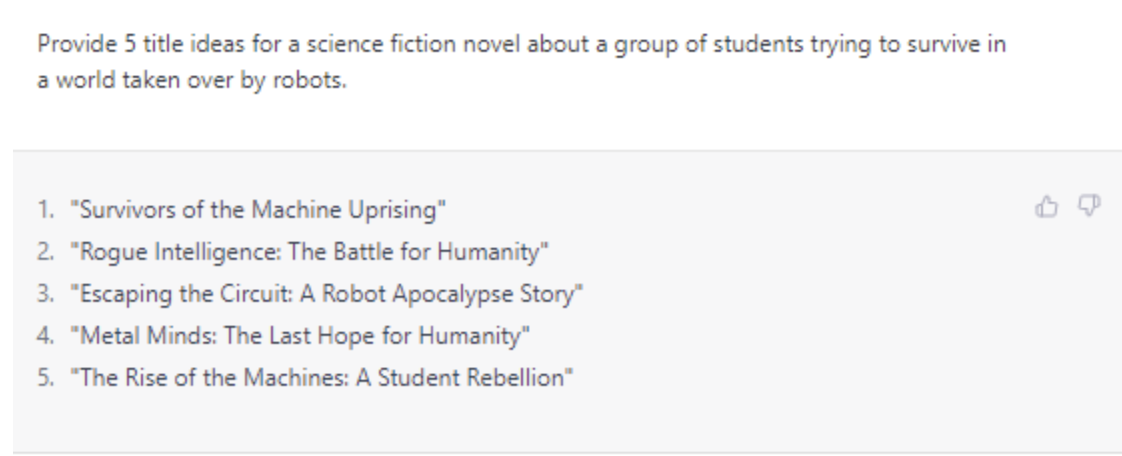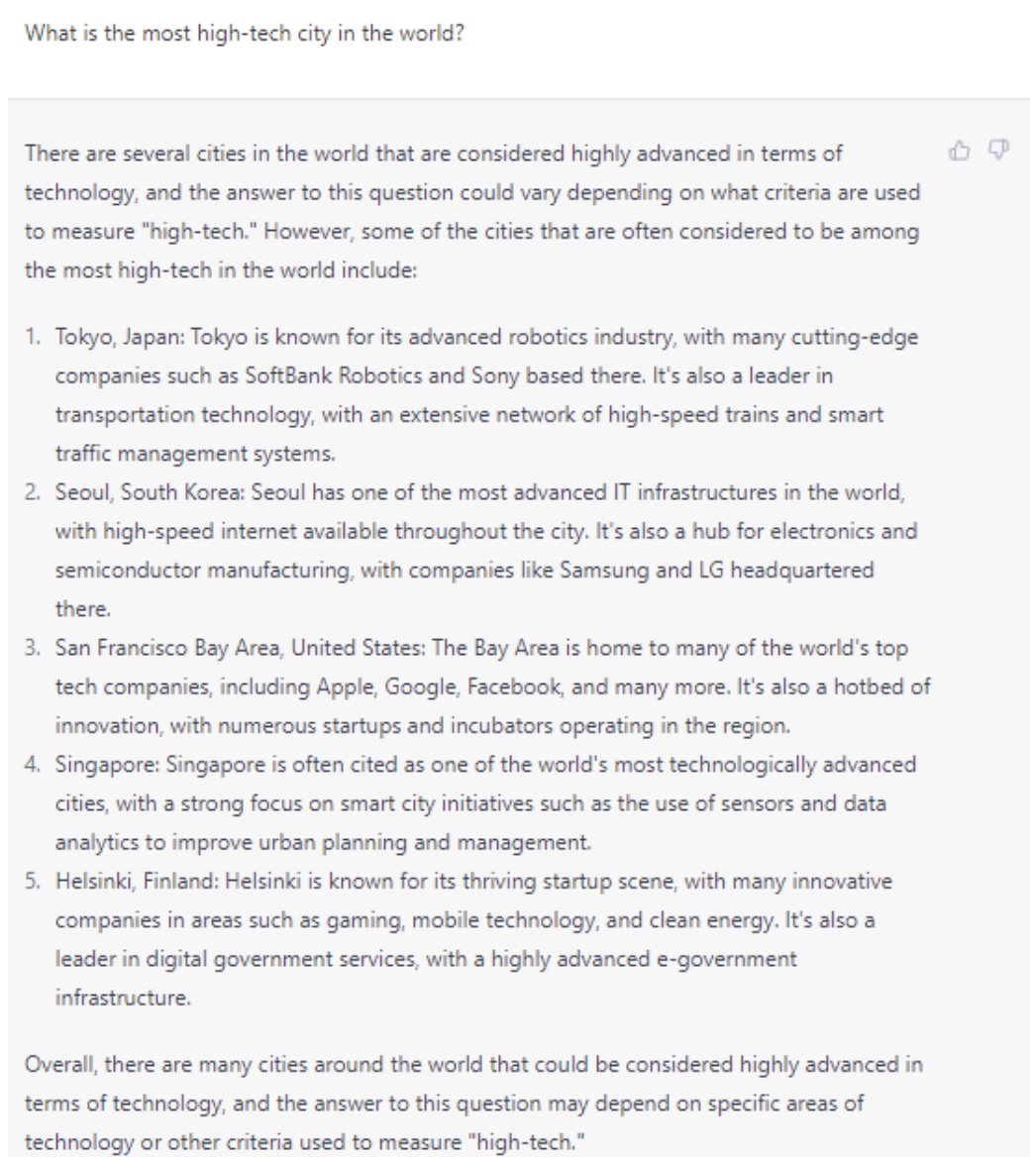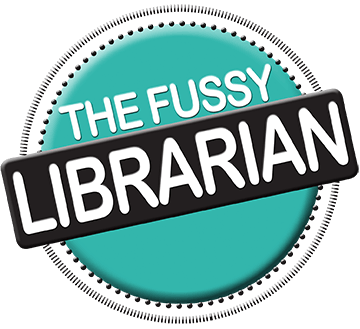Newswire
Posted on March 22, 2023 at 1:00 PM by Guest Author
There’s still a lot of debate about ChatGPT among creative professionals. But it can be a helpful tool if applied correctly. Let’s talk about AI for authors…
Table of Contents
A Brief Overview of ChatGPT
Unless you’ve avoided the internet for the past several months, you’ve probably at least heard of ChatGPT. But just in case, here’s a brief overview…
ChatGPT is a powerful chatbot developed by OpenAI using large language model (LLM) technology. By feeding it billions of writing samples, OpenAI trained ChatGPT to interact with users and produce content in a conversational way. Basically, you can ask questions or provide prompts and get fairly realistic responses.

A ChatGPT response to a prompt requesting five title ideas for a science fiction novel.

A ChatGPT response to the question “What is the most high-tech city in the world?”
Since ChatGPT was launched in November 2022, it has been used by hundreds of millions of people. The great thing about it is that it’s incredibly versatile and easy to employ. So, it’s no wonder that it’s made its way to the top of the list when it comes to AI for authors.
In fact, some of the earliest adopters of ChatGPT were Kindle novelists.
However, if you’re thinking about how you can use this tool (and others) to your advantage, it’s important to understand the benefits and the drawbacks.
The Pros and Cons of AI for Authors
Like other AI tools out there, ChatGPT can be a valuable addition to any author’s toolbox. As you know, the profession can be challenging, especially if you do most of the non-writing work (e.g., cover design, publishing, marketing) yourself. So, anything that could potentially make your job easier is tempting.
But there’s still a lot of debate about ChatGPT and other tools among creative professionals. As recent news about AI in publishing has shown, there are some issues stemming from its use. That’s why it’s worth looking at the pros and cons of AI (specifically ChatGPT) for authors. In doing so, you can determine the extent to which you should use it.
PROS
It can help you save time and increase productivity.
ChatGPT can deliver quick responses to questions or prompts. So, if you’re stuck on something, you can save time by applying the tool. It can also be used to automate certain tasks so you can focus on more important work.
It can be used for a variety of tasks.
This AI tool (and others like it) can serve several functions. For instance, it can generate ideas, provide feedback, answer questions, and produce content. Authors even use AI as a kind of extended thesaurus to find new ways of describing things.
It learns and improves over time.
ChatGPT and a lot of other AI tools are designed to get smarter. They use the feedback you and other users provide to improve the content generated. So, as you use it, you can enjoy better results.
CONS
It lacks human emotion and creativity.
For authors, emotion and creativity are essential to producing quality work — even with nonfiction. However, that’s not something AI can replicate. Although ChatGPT can mimic human language, it’s not capable of producing content that really resonates.
It can provide incorrect information.
When it comes to accuracy, ChatGPT, in particular, can be very hit-or-miss. In some cases, it can be confidently wrong; in others, it may not have an answer available (the training data only went up to 2021). The potential spread of misinformation from relying on AI-generated answers is why users need to be careful about managing outputs.
It may lead to plagiarism or copyright infringement.
ChatGPT can’t produce original content of its own. Instead, it uses the data it was trained on to construct a relevant response. And it only provides references when specifically asked. What this means is that if you apply the response to your own writing as is, you may end up inadvertently copying someone else’s work.
5 Tips for Authors to Use AI Like ChatGPT Wisely
Considering the advantages of ChatGPT and other AI for authors, it makes sense that you may want to give it a try. You just need to be sure that you use it the right way. Here are a few tips to help you add ChatGPT to your author toolbox wisely.
APPLY IT FOR BRAINSTORMING PURPOSES.
Using ChatGPT can get your creative juices flowing, especially when you have writer’s block. It’s a good way to get fresh ideas when you’re all tapped out. For example, you can use it to come up with story concepts, book titles, dialogue, character profiles, location descriptions, and more. You can also use it to create an outline for a new writing project, requesting its help fabricating summaries for each chapter.
REQUEST FEEDBACK ON YOUR WRITING.
When you need feedback on a new section or chapter, consider feeding it into ChatGPT. In doing so, you can get input on improvements to make your writing stronger. It’s one of the ways experts say the tool can maximize your writing. Plus, it’s helpful when you don’t have a real person available to look over your latest piece.
USE IT TO GENERATE MARKETING CONTENT.
Marketing content can be difficult to get right, but the use of AI, like ChatGPT, can help. By explaining what you need, you can generate content for a wide range of channels and functions. And all you’ll have to do is tweak it a little to fit your purposes.
Say you need an attention-grabbing subject line for your author newsletter. You can input a prompt explaining what the issue is about and how long the subject line should be.
Or, if you’re struggling to come up with a book blurb, you can provide your book’s Kindle description and get some options. You can even vary the length depending on where the blurb will be placed.
ALWAYS FACT-CHECK AND EDIT CONTENT.
As mentioned previously, AI tools like ChatGPT aren’t always accurate. And responses aren’t always perfectly suited to your needs. So, make sure to review and revise content accordingly before you use it.
-
If you ask a question, double-check the answer via more reliable sources.
-
If you provide a prompt, edit the response to fit your voice and style.
KEEP IN MIND IT’S JUST ANOTHER TOOL.
Finally, approach ChatGPT like you would any other tool. Remember that it’s not meant to replace you as the author and write an entire book for you. It’s meant to supplement your efforts and help you work more efficiently.
Even with an AI tool like ChatGPT at your disposal, you still need to be very hands-on.
Moreover, you need to make sure you’re using AI in a practical, ethical manner.
Takeaway
The subject of AI for authors will likely be going on for a while, but one thing is clear: ChatGPT can be a helpful tool if handled properly. If you need some assistance coming up with ideas, it can be a great resource. You just need to be careful with the extent you use it.
(Having valuable tools to help in your book marketing efforts is one thing; implementing proven tips is another. Download The Ultimate Guide to Increased Book Sales and get the expert marketing advice you need!)
Categories: Behind the scenes

